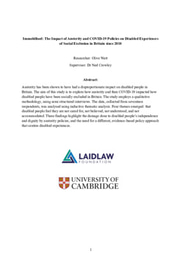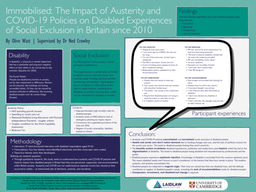Project outline: Immobilised: Welfare Policy and its Impact on Disabled Lives in Britain since 2010, with a focus on Austerity and the COVID-19 Pandemic
Introduction:
‘Grave, systemic violations of the rights of persons with disabilities.’
This was the result, according to a UN committee in 2016, of austerity policies in the UK. The cuts made to welfare spending following the 2010 election under the Conservative-Liberal Democrat coalition had significant consequences. Disabled people were arguably most affected and least listened to. Cuts to social care, the introduction of new types of welfare, and the emergence of a dangerous rhetoric around disability led to changes in the lives of disabled people. Then COVID hit, economic downturn resulted, and again Disabled lives were altered by policy decisions.
‘Crippled’ is a book by Frances Ryan which explores the impact of Austerity on disabled people. She explores how changes to the provision of benefits, cuts to social care, and the rhetoric used by politicians demonised disabled people in Britain. Ryan highlighted the clear links between policies and disabled people’s quality of life, but she could not have anticipated the additional challenges COVID would introduce. My intention therefore is to build on Ryan’s work, taking a more sociological approach, to examine how both austerity and COVID shaped policy and, in turn, disabled lives in Britain. My intention is to focus in specifically on experiences of social exclusion, taking account of the economic and social problems for disabled people that emerged alongside this. Focusing on the lived experiences of disabled people is paramount in a political landscape where they are viewed overwhelmingly in terms of cost, which feeds social exclusion by framing disabled people as a burden to the taxpayer rather than as human beings. This rhetoric in turn aMects how disabled people are treated by non-disabled people and by social actors within the welfare system.
I chose the term ‘immobilised’ because disabled people have been literally immobilised by the failures of the welfare state but also due to the challenges that have prevented coordinated political mobilisation among the disabled community, something I hope to change. The vast diversity of those who identify as disabled, negative social perceptions of disability, and the impact of health conditions on organisation have all contributed to this. My hope is that undertaking this research project will contribute to our understanding of disabled people, who are underrepresented in academic sociology and neglected by Westminster politicians.
Methodology:
I will begin my background research by using secondary sources, which will be both qualitative and quantitative. I will analyse newspapers, government and other reports, and policy documents to put together a longitudinal analysis of approaches to welfare policy since 2007.
I intend to use qualitative methods for the majority of my project, but I will use official statistics from the Office of National Statistics to track numerical impacts of policy, before going on to collect primary data to understand the human realities of this data.
This will enable me to analyse changes in approaches, rhetoric, and budget allocation before and after austerity.
For my original research, I will collect primary data through semi-structured interviews. Sampling will be a challenge, due to the scale and time frame of the project. I will use purposive sampling to select disabled participants using flyers, going through disability organisations, and word of mouth where possible. I do not expect to be able to obtain a sample that represents all disabled people in Britain. However, due to the qualitative approach I am taking and my focus on lived experiences, I believe that the project will still serve valuable purposes, and these interviews will enable me to both triangulate my research and gain deeper insights.
Timeline:
I will divide the six-week period into sections. Ahead of the summer research period I will need to put out advertisements for research participants. I will distribute these and establish contact with participants.
I will start the research period by carrying out longitudinal analysis of government policy and approaches. I expect that this will take two weeks. During this time, I will continue to recruit participants. I will then carry out the interviews and analyse my findings, which again I expect will take about three weeks, coding continuously. I will use the final week to gather and organise my findings and produce my recommendations based on these.
Intended outcomes:
If the project is successful, I expect to finish it with a deep understanding of picture of disabled experiences since 2010, and an understanding of how disabled people believe their lives have been impacted by austerity measures and COVID.
My intention with the research project is to end up with a set of policy recommendations and potentially other resources to address the issues which emerge in the duration of the project. This project would also contribute to my personal development goals, as it could form the basis for further research in my academic career.


Disciplines and links to existing organisations:
The project is both political and sociological. The project will draw on a huge body of work already conducted by charities such as SCOPE and Disability Rights UK.


Please sign in
If you are a registered user on Laidlaw Scholars Network, please sign in